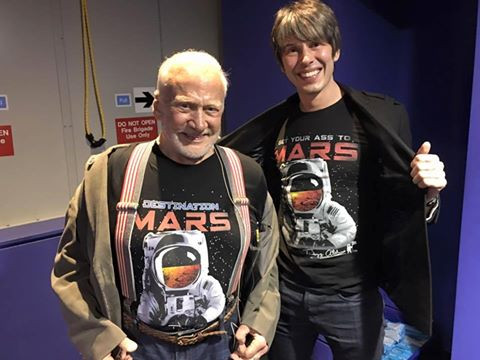Destination Mars: Buzz Aldrin envisions human colony on Red Planet arriving in 2040s
Buzz Aldrin believes humans will colonise Mars in the near future, with the first people to arrive there by around 2040. The former Nasa astronaut was discussing future manned Mars missions with Professor Brian Cox as London's Science Museum.
During the Destination Mars talk, Aldrin said getting people to Mars "is the easy part" and setting up a long-term sustainable base there will be the tricky part. "We know how to do that, we know how to get people there. It is being able to sustain yourself. [Getting to Mars] is very realistic, in my mind," the 86-year-old said.
Aldrin, who was the second person to set foot on the Moon, said there would not be much point sending people there and bringing them straight back, like the Apollo missions to the moon. Instead, he envisions an international collaborative base aided by big businesses.
Because Mars would only be able to provide between 15% and 20% of the resources needed to support a human colony, there would have to be regular trips running between Earth and Mars, carrying both supplies and people. He also said the Moon could be used as a staging post and that eventually there could be several hundred people living on Mars – a number that could be grown over time.

"I look at where we were 47 years ago leading the world in space exploration, having six landings on the moon, no one has done anything like that ever since. To take the step (to Mars), to take the movement, to take the action to begin to occupy ... is there anything bigger that humans could do on Earth than to leave and begin to occupy?"
"It is estimated that people on Mars initially could only produce 15% or 20% of what they need to eat. We would need to supply them continually. I feel that we need to concentrate our efforts on one major base (on Mars), to make that as close to being self-sufficient.
"If we try and be at many places the scientists may be happy but we'll have to bring people back, as we haven't built up a self-sustaining system and when people start to stay they will still need to be supplied.
Me & Professor Brian Cox are almost ready for liftoff! @sciencemuseum talking about #DestinationMars #Apollo11
Posted by Buzz Aldrin on Sunday, 28 February 2016
"We have to acknowledge that they can't grow everything they need. We are doing a lot of research on how to use the water that we can find there and the soil to grow from seeds enough to feed the people who are there. I don't think that you just put people there and that's it, you want to be building that up, and in order to do that you have to keep supplying more and more people and learning here how we can create the conditions on Mars to learn how to provide the people there with the means, whether it's some kind of fertiliser that we can discover and find some of it there."
Aldrin also said there would be plenty of people keen to take up permanent residence on the Red Planet. Indeed, the Mars One project – a privately funded mission to set up a colony on Mars – has shown this. It saw hundreds of thousand apply to take part in a one way trip to Mars following its launch in 2013.
However, Aldrin warned the decision to move to Mars has the potential to go wrong: "I can also see things getting a little tough and they regret the decision and their functioning going down and that being disruptive to people."
Regardless, he said international collaboration would be key to getting people to Mars. "It is very difficult for one nation to do everything, even at the moon, and a plan that brings people together and builds things at the moon that can be used at Mars, that becomes very, very helpful. We should ... not compete with other nations, especially China, but help them join all the rest."
© Copyright IBTimes 2025. All rights reserved.






















